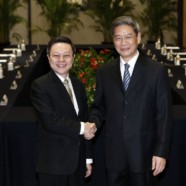China and Taiwan hold historic talks
China and Taiwan held their first government-to-government talks since they split 65 years ago after a brutal civil war – a symbolic yet historic move between the former bitter rivals, AFP news agency reported.
Wang Yu-chi, who oversees Taiwan’s China policy, arrived in Nanjing on Tuesday for a meeting with his Beijing counterpart Zhang Zhijun on the first day of a four-day trip, a Taiwanese official said.
“That we can sit here today, formally getting together, formally holding meetings, together exploring issues that people on both sides of the strait care about – this represents a new chapter for cross-strait relations, and is a day worth recording,” Wang said in initial remarks, AFP reported based on a statement.
Wang said he hoped Zhang could visit Taiwan “in the foreseeable future”.
Taiwan is likely to focus on reaping practical outcomes from the discussions, such as securing economic benefits or security assurances, while China has one eye on long-term integration of the island, analysts say.
Tuesday’s meeting is the fruit of years of efforts to improve relations.
But Beijing’s communist authorities still aim to reunite all of China under their rule, and view Taiwan as a rebel region awaiting reunification with the mainland.
“For us to simply sit at the same table, sit down to discuss issues, is already not an easy thing,” Wang said.
History
Nanjing was China’s capital when it was ruled by Wang’s Kuomintang, or Nationalist, party in the first half of the 20th century.
When they lost China’s civil war to Mao Zedong’s communists in 1949, two million supporters of the Nationalist leader Chiang Kai-shek fled to Taiwan.
The island and the mainland have been governed separately ever since, both claiming to be the true government of China and only re-establishing contact in the 1990s.
Over the decades Taiwan has become increasingly isolated diplomatically, losing the Chinese seat at the UN in 1971 and seeing the number of countries recognising it steadily decrease.
However, its military is supplied by the United States and has enjoyed a long economic boom.
China analyst Andrew Leung said the talks were “by no means” aimed at unification.
“Most of the Taiwanese people want status quo and China knows that time is on her side. So China’s in no hurry.”
“Most Taiwanese do not want to provoke China and all they want is for Taiwan businesses to grow.
There’s this very strong demand for closer ties with the mainland. Not for immediate unification, but for much closer ties.
“The closer the two sides are tied together, the better it is for Beijing…the better it is also for Taiwan economically.”

